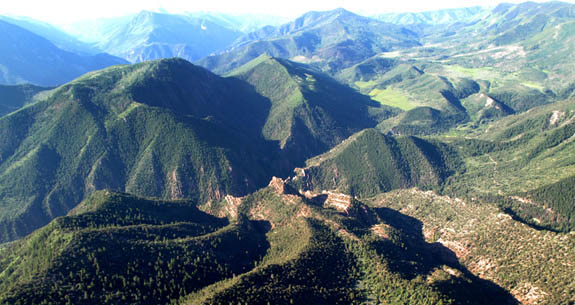Widgetized Section
Go to Admin » Appearance » Widgets » and move Gabfire Widget: Social into that MastheadOverlay zone
Public lands debate still roiling as Chaffetz withdraws bill to sell millions of acres

The Thompson Divide area near Carbondale is a flashpoint for the debate over how Colorado’s public lands should be used (Thompson Divide Coalition).
U.S. Rep. Jason Chaffetz, R-Utah, who grew up in Grand County, Colo., fanned the flames of intense debate over federal ownership of public lands this week, for the fifth time floating a bill to sell off millions of acres of U.S. Bureau of Land Management land across the West, including more than 90,000 acres in Colorado.
Then on Wednesday night he surprised a coalition of environmental groups, hunters and anglers opposed to the bill by pulling it from consideration in the Republican-dominated House, where it might have had a decent chance of passing into law this session with the GOP now controlling the White House and Senate as well.
“We are pleased to hear Representative Chaffetz has changed course on his effort to sell public lands and we thank him for listening to the voices of sportsmen and women. Across the country we have seen a groundswell of support for our public lands,” Trout Unlimited CEO Chris Wood said. “Selling them off cheats not only this generation but all those who follow.”
Before Chaffetz withdrew the bill, Colorado state Sen. Kerry Donovan, who last year passed a bill proclaiming a first-in-the-nation “Colorado Public Lands Day”, blasted the Chaffetz bill on Wednesday.
“In the opening days of the new administration, a back-room deal made it easier to transfer public lands out of public hands,” Donovan told RealVail.com, referring a rules change last month. “Now we see a Utah Republican taking a second step by introducing a bill that proposes we sell off selected BLM lands in Colorado.
“While the bills defines these lands as having no purpose, I think Coloradans would differ with that opinion. These public lands belong to all people and it is out of bounds for a representative from Utah to declare for all of us – hunters, backpackers, Jeepers, ranchers – that public lands have no purpose and should be sold.”
Donovan has vowed to be vigilant as the Trump administration potentially changes how public lands are managed. There’s been increasing protest around the West against a Republican Party platform that calls for transferring public lands to private or state control for development.
Before Chaffetz withdrew 621, Scott Braden, public lands and wilderness advocate for Conservation Colorado, issued this statement:
“We see both HR 621 and HR 622 as part of a coordinated assault on our public lands, with an ultimate goal of privatizing them altogether,” Braden said, referring to a bill (622) that would terminate the law enforcement responsibilities of both the U.S. Forest Service and BLM and provide federal grants for states to handle those responsibilities, basically ceding federal authority.
“Coloradans have repeatedly rejected this approach, and know that public lands are critical to our economy and way of life,” Braden added. “We hope that, as they did last year when establishing Colorado Public Lands Day, our elected leaders will stand up for our public lands and vow to keep them in public hands.”
Sportsman’s groups apparently played a big role in Chaffetz pulling the bill. He posted this on his Instagram account late Wednesday:
- jasoninthehouseI am withdrawing HR 621. I’m a proud gun owner, hunter and love our public lands. The bill would have disposed of small parcels of lands Pres. Clinton identified as serving no public purpose but groups I support and care about fear it sends the wrong message. The bill was originally introduced several years ago. I look forward to working with you. I hear you and HR 621 dies tomorrow. #keepitpublic #tbt
But sportsman’s groups are still promising to stay vigilant.
“Hunters and anglers are opposed to these threats to our public lands and access, and that’s why we established a direct line to decision makers through our sportsmensaccess.org site,” said Whit Fosburgh, president and CEO of the Theodore Roosevelt Conservation Partnership. “If you care about the future of public lands in the West and across the country, this is just another opportunity to say No way—and put it in writing.”
TRCP is also watching congressional efforts to overturn the BLM’s revised land-use planning rule, known as Planning 2.0, by using the obscure and infrequently utilized Congressional Review Act.
The new rule updates land-use tools established in 1983 and allowed local governments to have more say in federal land-management decisions. On the campaign trail, President Donald Trump riled up the oil and gas industry by advocating for greater local control over fracking operations, and he told Field and Stream Magazine he did not think public lands should be sold.
Hunting and angling groups hope Trump to sticks to his guns on those issues and that Congress backs off on rolling back local land-use tools like Planning 2.0.
“It has been publicly recognized by county commissioners and conservation districts that the BLM took meaningful steps between the draft and final planning rules to accommodate requests from local governments and the public to improve the process,” said TRCP’s Fosburgh. “Now, Congress is working to reduce agency transparency and limit the public’s ability to have a say in how their public lands are managed.”
David O. Williams
Latest posts by David O. Williams (see all)
- Neguse, Bennet call for halt to BLM emergency rule aimed at increasing Utah oil-train traffic - June 23, 2025
- The O. Zone: Trump’s long list of broken campaign promises just jumped to yet another forever war - June 23, 2025
- The O. Zone: Coming to Vail this summer? Leave fireworks, risky fire behavior at home - June 20, 2025


